Don't wanna be here? Send us removal request.
Photo

#PeeriMureedi Ki Duniya Mein Agar Koi Aahla Misaal Hai Toh Wo Hai #Hazrat_Nizam_ud_din_Awliyallah #Hazrat_Amir_Khusro (R.A) Ki.
Hazrat_Nizam_ud_din_Awliya Ki Apne Mureed Amir Khusro Ke Sath Iss Kadar Mohabbat Thi Ki Aap Kaha Karte The Ke, “Agar Khuda Ne Mujhse Pucha Ke # Nizam_ud_din Dunia Mein Se Kya leker Ke Aye Ho Toh Main Jawab Doonga Ke # Khusro Jaisa Mureed Tyaar Kar Ke Aaya Hoon.” Aap Ne YEh Bhi Farma Diya Ke Agar # Shariyat Iss Baat Ki Ijazat De Ke Ek Kabar Mein Do Logon Ko Ikatha Dafnaya Ja Sakta Toh Main Vasiyat Kar Ke Jata Ke #Khusro Ko Mere Sath Meri Hi Kabar Mein Dafnaya Jaye Kyu Ki Main #Khusro Ke Bina Nhi Reh Sakta.
#Hazrat_Nizam_ud_din_Awliya Ki Wafat ke Waqt #Hazrat_Amir_Khusro Delhi Mein Nahi The-, Aap Ne Apne Aakhri Safar Se Pehle Apne Mureedon Ko Hadayit Kar Di Thi Ke #Khusro Ko Meri Kabar Ke Paas Mat Aane Dena. Kahin Aissa Na Ho Ke #Khusro Ko Milane Ki Tarrap Mein Meri Kabar Hi Shakk(Fatt) HoJaye.
Apne Peero Murshid Ki Wafat Ke Baad #Hazrat_Amir_Khusro Ki Haalat Deewano Jaisi Ho Gyi, Ankhein # Peer_o_Murshid Ke Yaad Mein Namm Rehne Lagi. Aap Kehte Firte_ _ _ “Teri Soorat Si Nhi Milti Kisi Ki Soorat, Hamm Jahaan Mein Teri Tasveer Liye Firte Hain.” Apne Peero Murshid Ki Wafat Ke Baad #Hazrat_Amir_Khusro Zada Der Tak Zinda Nhi Rahe. Jaisa Ke #Hazrat_Nizam_ud_din_Awliya Apni Hayat Mein Farmaya Karte The Ki #Khusro Mujhe Iss Dunia Se Challe Jaane Ka Koi Gamm Nhi Magar Gamm Iss Baat ka Hai Ke Mere Bina Tum Bhi Iss Jahan Mein Zyada waqt Nhi Rahogge. Aisa Hi Huya. Apne Peero Murshid Ke # Mazar_e_Mubarak Par Yeh AShayar Bol Ker Apni Jaan Chorr Diye # Khusro_Sahab ne-_-_ _
“Gori Sowe Sej Par Mukh Par Daare Kes, Chal Khusro Ghar Apne Ab Saanj Pyi Chaun Des.” 🌻fb/insta/khudi ki pehchan
2 notes
·
View notes
Text
You did not have to search far for me, for I have been with you since the beginning. Look for my soul inside of yours.
A Rumi inspired piece I wrote back in 2017 when I was known as Honour Speaks on Instagram (I have since left Instagram several years ago.) I was heavily influenced by sufi style back then. Giving this piece new life. Dedicating it to a dear friend of mine.
Music by Cengiz Kurtoğlu.
219 notes
·
View notes
Text

Online Treasure of Sufi and Sant Poetry
Introduction
Understanding the Essence of Sufi and Sant Poetry
Define Sufi Poetry
Define Sant Vani
Importance and relevance in modern times
Sufi/Sant Poetry: A Rich Heritage
Historical Background
Origins of Sufi Poetry
Development of Sant Vani
Famous Sufi Poets and Their Contributions
Bulleh Shah
Rumi
Amir Khusro
Renowned Sant Poets and Their Works
Kabir
Tulsidas
Guru Nanak
Sant Vani: The Spiritual Songs
Definition and Importance of Sant Vani
Connection with spirituality and daily life
Prominent Themes in Sant Vani
Love
Devotion
Humanity
Notable Compositions in Sant Vani
Kabir's Dohas
Guru Nanak's Bani
Tulsidas' Ramcharitmanas
Sufi Qawwalis: The Soulful Melodies
Origins and Evolution of Qawwali
Historical context and cultural significance
Famous Qawwals and Their Contributions
Nusrat Fateh Ali Khan
Sabri Brothers
Abida Parveen
Impact of Qawwalis on Society
Influence on music and cinema
Role in spiritual gatherings
Sufi Kalam: The Divine Verses
Meaning and Importance of Sufi Kalam
Spiritual and philosophical insights
Key Figures in Sufi Kalam
Rumi
Hafez
Shah Hussain
Popular Sufi Kalam Collections
Mathnawi by Rumi
Diwan-e-Hafiz
Heer Ranjha by Waris Shah
E-Books: Accessing the Treasure
Availability of Sufi and Sant Poetry E-Books
Benefits of digital access
Top Online Platforms for Sufi and Sant E-Books
Sufinama
RekhtaBooks
Project Gutenberg
Recommended E-Books for Sufi and Sant Poetry
"The Essential Rumi" by Coleman Barks
"Songs of Kabir" by Rabindranath Tagore
"The Conference of the Birds" by Attar of Nishapur
Conclusion
The Continuing Relevance of Sufi and Sant Poetry
Modern interpretations and adaptations
Influence on contemporary literature and art
Exploring Further
How to engage with and study Sufi and Sant poetry
Online resources and communities
Example Content Sections:
Understanding the Essence of Sufi and Sant Poetry
Sufi and Sant poetry are two deeply spiritual and philosophical traditions that have enriched the cultural and literary heritage of South Asia and beyond. Sufi poetry, often associated with mysticism and the quest for divine love, is known for its profound depth and emotional resonance. Sant Vani, on the other hand, comprises the devotional songs of the Sant tradition, emphasizing ethical living, devotion to God, and social equality.
These poetic forms have not only provided spiritual solace to millions but have also acted as a medium for social reform, challenging rigid societal norms and advocating for a more inclusive and compassionate worldview.
Famous Sufi Poets and Their Contributions
Bulleh Shah Bulleh Shah is one of the most celebrated Sufi poets whose verses transcend the boundaries of time and culture. His poetry, written in Punjabi, is a testament to his profound spiritual journey and his quest for unity with the Divine. Bulleh Shah’s works, such as "Bulleya Ki Jaana Main Kaun," are timeless classics that continue to inspire and resonate with readers around the world.
Rumi Jalal ad-Din Muhammad Rumi, more commonly known as Rumi, is perhaps the most famous Sufi poet in the world. His works, written in Persian, have been translated into numerous languages and are widely read across the globe. Rumi’s poetry, encapsulated in his magnum opus "Masnavi," explores themes of divine love, the soul’s journey towards God, and the nature of existence.
Amir Khusro Amir Khusro, a prolific Persian poet and a disciple of Nizamuddin Auliya, made significant contributions to Sufi literature and music. He is often credited with the invention of several musical instruments and the development of new genres of poetry. His ghazals and qawwalis are integral to the Sufi musical tradition and continue to be performed with great reverence.
Prominent Themes in Sant Vani
Sant Vani, the poetic expressions of the Bhakti saints, often revolve around themes of love, devotion, and social justice. The Bhakti movement, which gave rise to Sant Vani, sought to transcend the barriers of caste and creed, promoting a direct and personal relationship with the Divine.
Love and Devotion The Bhakti saints, such as Kabir and Guru Nanak, emphasized the importance of love and devotion in their teachings. Kabir’s dohas (couplets) are renowned for their simplicity and profound wisdom, urging individuals to seek the Divine within themselves and to practice love and compassion in their daily lives.
Humanity and Social Equality The Bhakti poets often used their verses to challenge societal norms and advocate for social justice. Guru Nanak, the founder of Sikhism, composed hymns that spoke against the caste system and gender discrimination, promoting the ideals of equality and universal brotherhood.
Famous Qawwals and Their Contributions
Qawwali, a form of Sufi devotional music, has a rich history and a profound impact on South Asian culture. This genre, characterized by its repetitive and hypnotic melodies, is designed to induce a state of spiritual ecstasy and divine connection.
Nusrat Fateh Ali Khan Nusrat Fateh Ali Khan is often hailed as the greatest qawwal of all time. His powerful voice and emotive renditions of Sufi poetry have captivated audiences worldwide. His contributions to qawwali music have not only preserved this ancient tradition but also brought it to the global stage, influencing musicians across various genres.
Sabri Brothers The Sabri Brothers, a legendary qawwali group from Pakistan, are known for their dynamic performances and soulful renditions of Sufi poetry. Their qawwalis, such as "Bhar Do Jholi Meri" and "Tajdar-e-Haram," are celebrated for their spiritual fervor and emotional depth.
Abida Parveen Abida Parveen, one of the most iconic female Sufi singers, has made significant contributions to the world of Sufi music. Her powerful and evocative voice has brought the poetry of Sufi saints to life, making her one of the most revered figures in the genre.
Recommended E-Books for Sufi and Sant Poetry
For those looking to delve deeper into the rich traditions of Sufi and Sant poetry, numerous e-books are available online. These digital collections provide a convenient way to explore the profound wisdom and spiritual insights of the Sufi and Bhakti poets.
"The Essential Rumi" by Coleman Barks This renowned translation of Rumi’s poetry by Coleman Barks captures the essence of Rumi’s mystical and spiritual insights. The book includes some of Rumi’s most famous poems, making it an essential read for anyone interested in Sufi literature.
"Songs of Kabir" by Rabindranath Tagore Rabindranath Tagore’s translation of Kabir’s dohas brings the profound wisdom of this Bhakti saint to a global audience. The book offers a selection of Kabir’s most insightful and thought-provoking verses, providing a glimpse into his spiritual teachings.
"The Conference of the Birds" by Attar of Nishapur This classic Persian poem, written by the Sufi poet Attar of Nishapur, is an allegorical journey of the soul towards enlightenment. The book, available in various translations, is a profound exploration of Sufi philosophy and spiritual quest.
11 notes
·
View notes
Text
“Parh parh ilm hazaar kitabaan, Kadi apnay aap noun parheya nahin, Jaan jaan warhday Mandir Maseeti, Kadi mann apnay wich warhiya ni, Aiwaiyen larda ai shaitan de naal bandeya, Kadi nafs apnay naal lareya nahi, Aakhe peer Bulleh Shah aasmaani phar naen jehra man wich wasda aunhun phareya nahin”
— Bulleh Shah Yes, you have read thousands of books, Yet you have never read your own self, You go rushing into temples and mosques, Yet you have never entered your own heart, You continue fighting futile battles with Satan, Yet you have never fought your own ego/desires, Saint Bulleh Shah says you try to touch the one in the sky, Yet you never tried to touch the one who lives in your heart.
95 notes
·
View notes
Text
نیند نہ ویکھے بسترا ، تے بھک نہ ویکھے ماس
موت نہ ویکھے عمر نوں ، تے عشق نہ ویکھے ذات
-
Neend Na Wekhe Bistra, Teh Bhuk Na Wekhe Maas,
Maut Na Wekhe Umar Nu, Teh Ishq Na Wekhe Zaat
32 notes
·
View notes
Text
«Zehaal-E-Miskeen | Amir Khusro
–This poem is written by Amir Khusro in Persian and Brij Bhasha. Brij Bhasha is a Dehaati Zabaan (country tongue) and a dialect of Hindi. In the first verse, the first line is in Persian, the second in Brij Bhasha, the third in Persian again, and the fourth in Brij Bhasha.
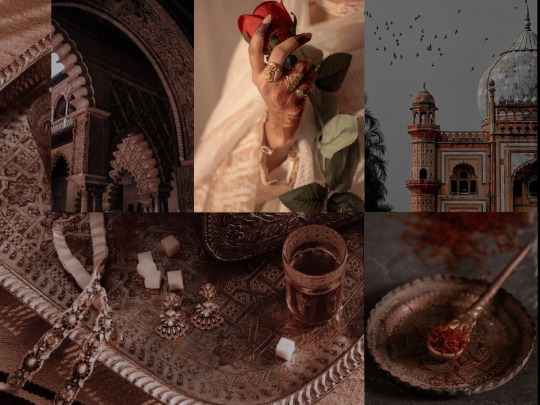
Zehaal-e-miskeen makun taghaful, Duraye naina banaye batiyan.
Do not overlook my misery, by blandishing your eyes and weaving tales,
Ke taab-e-hijran nadaram ay jaan, Na leho kahe lagaye chatiyan.
My patience has over-brimmed, O sweetheart! why do you not take me to your bosom.
Shaban-e-hijran daraz chun zulf, Wa roz-e-waslat cho umer kotah.
Long like curls in the night of separation short like life on the day of our union.
Sakhi piya ko jo main na dekhun, To kaise kaTun andheri ratiyan.
My dear, how will I pass the dark dungeon night without your face before.
Yakayak az dil do chashm-e-jadu, Basad farebam baburd taskin.
Suddenly, using a thousand tricks the enchanting eyes robbed me of my tranquil mind.
Kisay pari hai jo ja sunave, Piyare pi ko hamari batiyan,
Who would care to go and report this matter to my darling.
Cho shama sozan cho zaraa hairan, Hamesha giryan be ishq an meh.
Tossed and bewildered, like a flickering candle, I roam about in the fire of love.
Na nind naina na ang chaina, Na aap aaven na bhejen patiyan,
Sleepless eyes, restless body, neither comes she, nor any message.
Bahaq-e-roz-e-visaal-e-dilbar, Ke daad mara gharib Khusro.
In honour of the day I meet my beloved who has lured me so long, O Khusro!
Sapet man ke varaye rakhun, Jo jaye pauN piya ke khatiyan.
I shall keep my heart suppressed if ever I get a chance to get to her trick.
_________________________________________________
66 notes
·
View notes
Text
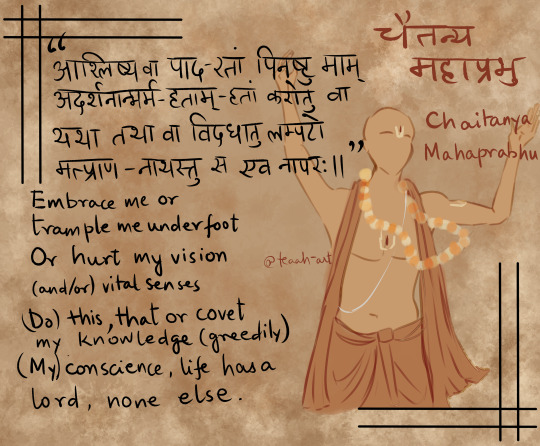
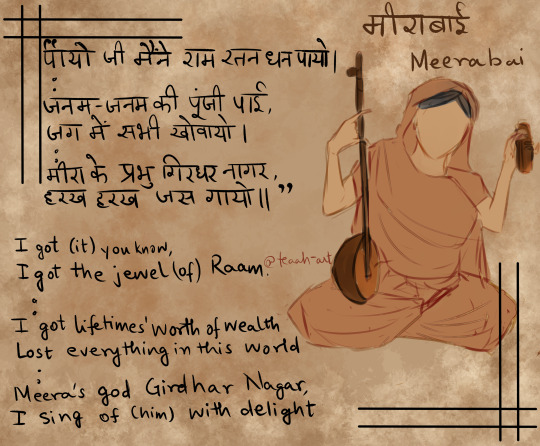
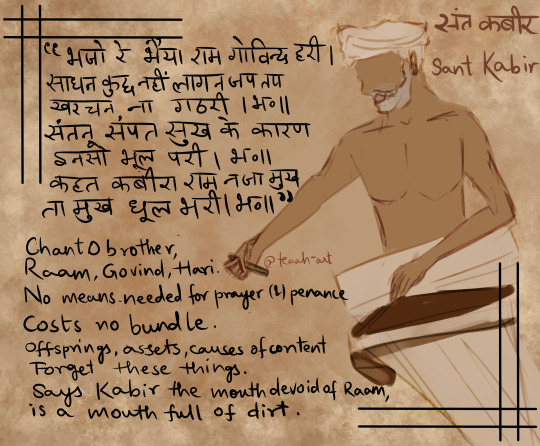
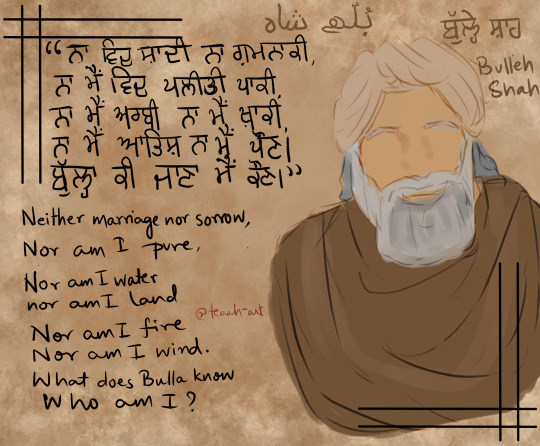
Desi LGBT Fest 2023 (hosted by @desi-lgbt-fest)
Day 7 : Faith/Rituals of Love
Definitely geared heavily towards the 'Faith' part of this prompt as soon as I read it!
If being Queer is defying conventions and if being a part of the Queer community means going against heteronormativity and gender conformity, is it not Queer to forego materialistic ties and the love of a human partner and embrace the love of a greater being you have only heard about in stories?
All four individuals featured here were integral part of the Bhakti Movement and/or Sufism in South Asia. None were married other than Meerabai.
(Panel order from top to bottom)
Chaitanya Mahaprabhu (1486-1534) : A key name of the Bhakti Movement and the Gauriya Vaishnav tradition in 15th Century Bengal, Chaitanya Mahaprabhu was believed to have been a vessel for both Radha and Krishna. Bengali doesn't use pronouns or gendered language and we may never know what they would have preferred to be identified as in a language they didn't know (English), I will simply resort to using They/Them for them. Their written teachings are few and far between but the verse mentioned here is the seventh verse of the only written record of their teachings, the Shikshastakam - a collection of 8 total verses. The translation here is my own and quite literal so that the interpretation is left to the reader.
Meerabai (1498-1597) : [CW : IMPLIED QUEERPHOBIA/APHOBIA] Meerabai was born into Rajput royalty and was married off, also to Rajput royalty, in likely an arranged marriage. While most of the stories surrounding her are folklore whose historicity is yet to be confirmed, her marital status can be confirmed, and so can her devotion and affection for Krishna and the divine, which she has herself penned in numerous poems and songs. Folklore does strongly imply that she was non-committal to her marriage and that her in-laws tried to poison her to death multiple times for it.
Kabir (1398–1448 or 1440–1518) : Found as an orphan by a Muslim weaver couple, Kabir's religion grew to become somewhat of an enigma for future generations. His stance, however, on the topic romance and marital relationships is quite clear - he looked down upon them and a huge chunk of his couplets strongly imply that romantic and sexual relations simply obstruct spiritual enlightenment.
Bulleh Shah (1680-1757) : Bulleh Shah, though an ardent proponent of loving the divine, was declared a Kafir, a non-believer/non-Muslim by a quite a few Muslim clerics of the time. He was known for speaking up against existing power hierarchies of the time and used vernacular speech for his writings (Punjabi, Sindhi) which not only served to popularize his works, but also let people connect to his words.
A personal note on my motivations under the cut.
A while back when I was actively going through the anxiety of finding out that I am ace and that I will never fit into the current South Asian society that the wedding industry has a chokehold on, I desperately wanted to see people from my own culture living happily without a partner. During one of my history rabbit hole escapedes, I restumbled upon the story of Meerabai, how she always insisted on loving and devoting herself towards Krishna, despite being married into a normative and wealthy household and despite her in-laws repeatedly attempting to poison her for not committing to her husband. Most of us from India grow up hearing about Meerabai, her spiritual connections to Krishna, and her struggles. The moral of those stories is always framed as 'believe in god, he will help you through tough times'. But this was the first time I was making a different connection, I was drawing different morals. And when I took Meerabai's non-conformity to her married life and started looking for more examples like hers, I was overwhelmed by how many more individuals existed without a partner, condemned being in a normative, married relationship, admitted to having lost human connections and faced resistance even, and yet stayed true to their orientation and sounded HAPPY! It was extremely hard to narrow it down to these four, but these do make my point! Labels are hard to transpose across cultures and history. But if being queer means being nonconforming of marital structures and being aspec/arospec implies neutrality, indifference, or aversion to romance and intercourse, then no one fits the label if they don't.
112 notes
·
View notes
Video
youtube
Amir Khusro - Zehaal-E-Miskin (Hindvi Poetry)
Amir Khushro was a Muslim mystic, major classical poet, and musician who lived in the India of the XIII-XIV centuries.
His poetry is written mostly in Hindvi, which is Hindustani (N. Indian) language with heavy Persian influence.
This beautiful poem has in fact a meaning on more than one level, as it is usually the case with this type of poetry.
It is on a first level a poem of erotic desperation, but on a deeper level it is about the separation of the mystic from God and the hope of reunion with Him.
This video is from the very good youtube channel Banana Poetry , which is devoted to Urdu poetry.
I have found this transliteration and English translation of the poem, by the youtube user aman anand :
Zehaal-e-miskeen makun taghaful,
Duraye naina banaye batiyan.
Do not overlook my misery,
by blandishing your eyes and weaving tales,
Ke taab-e-hijran nadaram ay jaan,
Na leho kahe lagaye chatiyan.
My patience has over-brimmed, O sweetheart!
why do you not take me to your bosom.
Shaban-e-hijran daraz chun zulf,
Wa roz-e-waslat cho umer kotah.
Long like curls in the night of separation
short like life on the day of our union.
Sakhi piya ko jo main na dekhun,
To kaise kaTun andheri ratiyan.
My dear, how will I pass the dark dungeon night
without your face before.
Yakayak az dil do chashm-e-jadu,
Basad farebam baburd taskin.
Suddenly, using a thousand tricks
the enchanting eyes robbed me of my tranquil mind.
Kisay pari hai jo ja sunave,
Piyare pi ko hamari batiyan,
Who would care to go and report
this matter to my darling.
Cho shama sozan cho zaraa hairan,
Hamesha giryan be ishq an meh.
Tossed and bewildered, like a flickering candle,
I roam about in the fire of love.
Na nind naina na ang chaina,
Na aap aaven na bhejen patiyan,
Sleepless eyes, restless body,
neither comes she, nor any message.
Bahaq-e-roz-e-visaal-e-dilbar,
Ke daad mara gharib Khusro.
In honour of the day I meet my beloved
who has lured me so long,
O Khusro! Sapet man ke varaye rakhun,
Jo jaye pauN piya ke khatiyan.
I shall keep my heart suppressed
if ever I get a chance to get to her trick.
8 notes
·
View notes
Text
Read somewhere " Aur phir meine sari zindagi jis cheez ki khuwahish ki wo muhabbat thi , aur wo wahid cheez jo mujhe sari zindagi na mili wo bhi muhabbat hai "
233 notes
·
View notes
Video
𝙋𝙖𝙨𝙨𝙞𝙤𝙣𝙖𝙩𝙚 𝙇𝙤𝙫𝙚 𝙞𝙣 𝙋𝙚𝙧𝙞𝙤𝙙 𝙎𝙝𝙤𝙬𝙨 🌷
Song: This Love by Taylor Swift
Shows listed:
Reign | Anne With An E | Persuasion | The Irregulars | Vatanim Sensin | Pride and Prejudice | Emma | Enola Holmes | Sanditon | Bridgerton 🎬✨❤️
My fondness. My merriment.
PERIOD SHOWS IS MY LIFEBLOOD ♡
(made a new edit for some of my favorite period shows ships~)
179 notes
·
View notes
Text
I bought a big plastic skeleton to learn anatomy and now it’s name is Rosita and she listens to my late night rants like the good little bony friend she is
98 notes
·
View notes
Text

hi i made a uquiz
what are your chances of surviving the end of the world?
19K notes
·
View notes
Text
When an unstoppable force meets an immovable object, it penetrates it. It’s immovable, not impenetrable.
672 notes
·
View notes
Photo

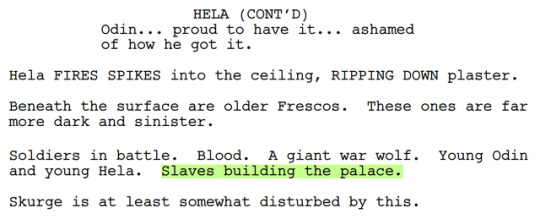

The Asgard palace was built by slaves. The “slave master” cracking a whip in the fresco is Thor’s grandfather Bor (who was “decapitated” by Thor in TDW😭)
579 notes
·
View notes
Text
Anyone knows what is this kind of photography called

422 notes
·
View notes

